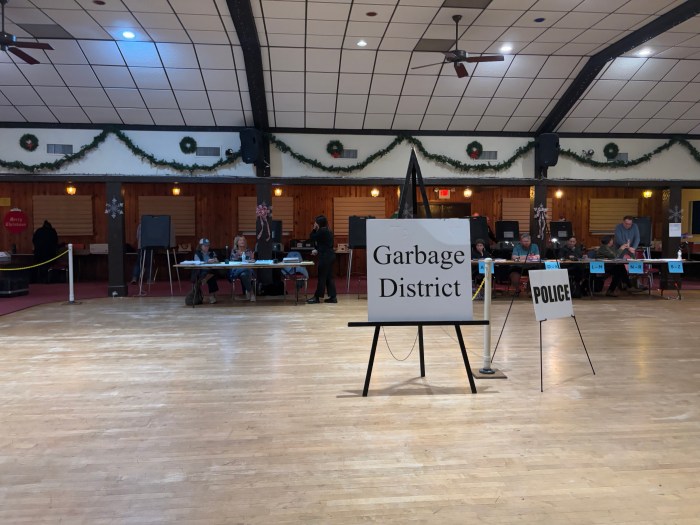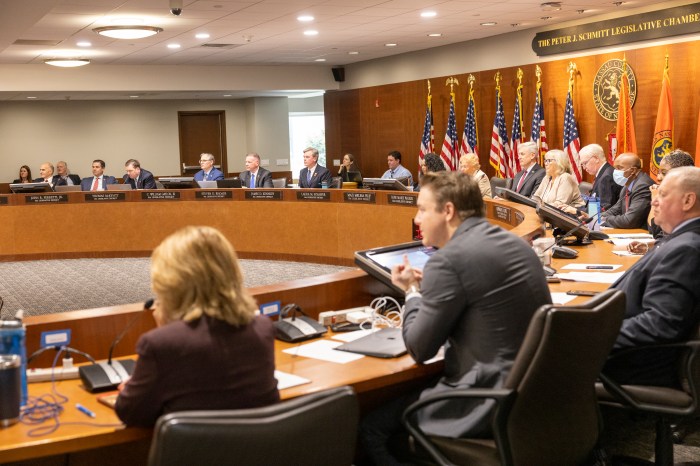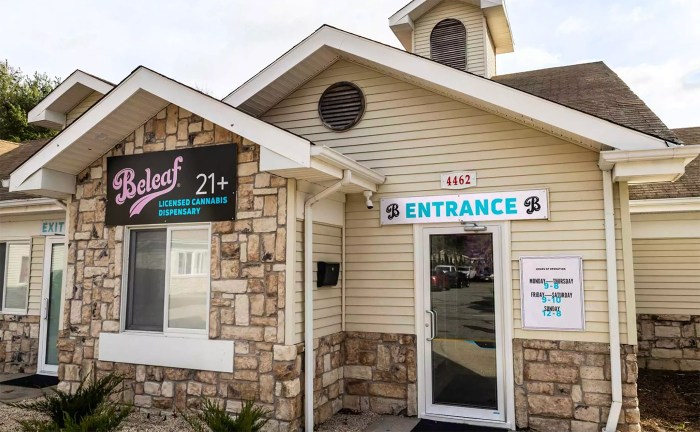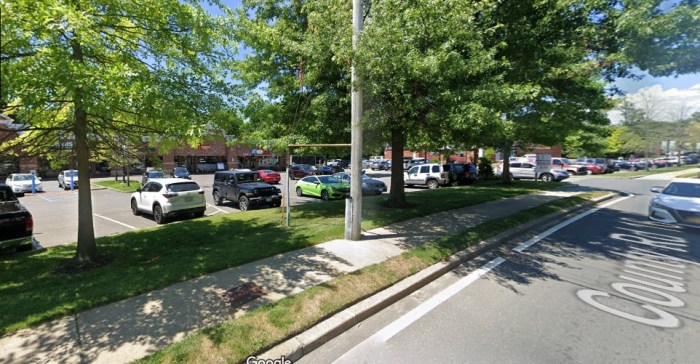Herricks Installs Hand Sanitizers in Classrooms
At the last meeting of the Herricks school board, Herricks Superintendent Dr. Jack Bierwirth announced that in each classroom of Herricks schools hand sanitizers have been installed.
Dr. Bierwirth stressed, “This, by no means, takes the place of washing hands, and all boys and girls lavatorys will be constantly equipped with extra soap. But, the hand sanitizers are just an extra precaution in an effort to kill the deadly H1N1 flu virus that is on the minds of so many administrators, teachers and parents of students returning to school.”
Dr. Bierwirth said that in a meeting with all school administrators earlier in the year, it was decided to send out a uniform letter from the Nassau County Health Department Commissioner Maria Carney to each district to be shared with administrators, teachers and parents in the district regarding the rules in addressing the H1N1 flu.
That letter is reprinted at the end of this article and will be sent out as the Herricks school district opens for the fall season
One of the questions asked, during the discussion, was when can children go back to school and the rule is to keep children home from school, day care or camp for at least 24 hours after their fever is gone. Their fever should be gone without their having to take a fever-reducing medicine. A fever is defined as 100 degrees F or 37.6 degrees C.
Board Holds Discussion on Proposed Cell Phone Policy
The school board also is reviewing a policy concerning cell phones in the district at each school level.
It was pointed out, by board president Richard Buckley, that more and more children have cell phones and he agreed that they are both a helpful tool for communication, especially in a real emergency, but are also a huge distraction when used during class.
It was pointed out that the challenge is to develop policies which balance the desire of parents and students to be able to communicate with each other in appropriate circumstances with the desire of teachers and parents to have an educational environment which allows all students and their teachers to focus their full energy and attention on learning.
Proposed Cell Phone Policy
A rough draft of the policy was presented at the last Herricks School Board meeting. The following guidelines are in the process of being developed for use in the district including staff and visitors.
In the policy the following is stated: As with all disciplinary cases, teachers and administrators are expected to make the final determination of appropriate discipline based on specific circumstance.
Elementary School
Student use or possession of cell phones at the elementary level is strongly discouraged. Special circumstances which would require the student to have a cell phone should be discussed with the building principal in advance.
It was determined, at the meeting that children even in the second grade often come to school with cell phones.
Middle School
Students are permitted to have cell phones, but all phones must be off (not on vibrate) throughout the school day and not visible.
For the first and second infraction-A warning will be issued to the student. The cell phone will be confiscated by the staff member and sent to the main office. The cell phone may be picked up by the student in the main office at the end of the day.
Third infraction-Lunch detention with notification to the family. The cell phone will be confiscated by the staff member and sent to the main office. The cell phone can only be picked up by the student’s parents from the main office.
Further infractions-Cell phone confiscated by the staff member and sent to the main office. The parents contact. Parents must then pick up the cell phone or make arrangements with the assistant principal or principal for pickup. Student discipline will be after-school detention or one-day suspension.
High School
Cell phones permitted in non-instruction areas only. Cell phones must be off (off, not on vibrate) and not visible in any instructional area. Instructional areas are defined as any classroom, computer lab, auditorium, gym, library or meeting room in which students are present and receiving instruction, studying, reading, taking a quiz or test.
First Infraction-Warning-cell phone sent to the assistant principal’s office by the staff member. Student required to meet with the assistant principal at the end of the day to retrieve cell phone.
Second Infraction-One-hour detention. Cell phone sent to the assistant principal’s office by the staff member for retrieval by the student at the end of the school day. Parents contacted by the assistant principal.
Third infraction-Two-hour detention. Cell phone sent to the assistant principal’s office by the staff member. Parents contacted by the assistant principal. Parents must then pick up the cell phone or make arrangements with the assistant principal for pickup.
Fourth infraction-In school suspension-Cell phone sent to the assistant principal’s office by the staff member. Parents will be contacted and must then pick up the cell phone or make arrangements with the assistant principal for pickup.
Staff at All Levels and Parent Visitors
No cell phone or text messaging use in instructional areas. Instructional areas are defined as any classroom, computer lab, auditorium, gym, library or meeting room n which students are present and receiving instruction, studying, reading, taking a quiz or test. Cell phone off or on vibrate at all other times, if possible. When and where possible, staff and parents are encouraged to use cell phones in areas not visible to students.
After all the use and their infractions were outlined, school board president Richard Buckley said he felt strongly about the fourth infraction at the middle school and the high school that states a student will be given in-school suspension or a one-day suspension.
Buckley said, “I don’t believe in any reason to keep students out of class.”
Dr. Bierwirth said, “That is why, in the proposed policy, there is a line in italics that states, “determination of appropriate discipline based on the specific circumstances.” He said, each case will be judged “case by case.”
Most of the board agreed with Buckley, but said there has to be some way that the students respect the cell phone law.
Since the policy was just proposed, there was no vote at this time on the proposal. However, it will be “tweeked” and presented at another board meeting.
Saturday Recreation Program to Raise Fee by Two Percent
The board approved the fee for the Saturday Recreation Program from, $94 to $96. Since the fee was not raised for this program last year, the board agreed to an increase this year. Further the salary for instructors will be increased from $30.25 to $30.85 per hour and the director from $44.98 to $45.87 per hour.
High School Track
The board approved the amended resolution for the Herricks High School track. That the resolution of July 1,’09 pertaining to the award of the bid for the track be amended to be awarded to The LandTek Group, of Amityville for a total cost of $639,000.
Herricks Community Center Roof Replacement
On Aug. 13 the board approved a proposal from Statewide Roofing, of Islip for the replacement of the Community Center auditorium. Roof, not to exceed $489,150.
Update on 2009 PISA
Dr. Bierwirth explained, “The company contracted to run the 2009 PISA in the United States under the auspices of the United States Office of Education wanted to charge the Herricks district and any other district or state participating independently in the next international assessment almost quadruple what we were changed in ’06. Accordingly, we have decided not to participate. Apparently no other district will either.”
Board Appoints Education Liaisons for the ‘09-‘10 School Year
Acorn Ponds-Peter Grisafi, AGATE-Richard Buckley, Albertson Soccer-Peter Grisafi, Albertson-Herricks Little League-Peter Grisafi, Art Booster Association-Richard Buckley, Browers Hill Civic-Richard Buckley, Center Street PTA-Paul Ehrbar, Denton Avenue PTA-Sanjay Jain, Herricks Community Fund-Christine Turner, Herricks Senior Citizens (Wednesday)-Christine Turner, Herricks Council of PTAs-Buckley/Turner, Herricks Music Boosters-Sanjay Jain, Herricks High PTSA-Richard Buckley, Herricks Athletic Boosters-Paul Ehrbar, Herricks Community Coalition-Peter Grisafi, Herricks Leisure Club (Thursday)-Richard Buckley, Herricks Middle School PTA-Christine Turner, New Hyde Park Wildcats-Peter Grisafi, Searingtown School PTA-Peter Grisafi, Herricks SEPTA-Paul
Ehrbar, SPA (STAC Parents Association)-Sanjay Jain, Williston Park Little League-Paul Ehrbar, Youth Council-Paul Ehrbar, Herricks Indo-US Community-Sanjay Jain, Chinese American Association of North Hempstead-Buckley/Turner.
Toward the end of the meeting Trustee Ehrbar wanted to know if the district would be broadcasting President Obama’s address to the children and Dr. Bierwirth said that the address was scheduled for Sept. 8 and the Herricks Schools will not open until Sept. 9. Therefore, the answer is “no” since the students will not be back in time.
The board meeting ended and the next meeting will be held on Sept. 17 at 7:15 p.m. at the Herricks Community Center, 999 Herricks Road, New Hyde Park.
The following is a message From the Nassau County Department of Health Commissioner Maria Carney, MD, to all school districts: Subjects
HIN1 Influenza
The Nassau County Department of Health (NCDOH), New York State Department of Health and the Centers for Disease Control and Prevention (CDC) have been monitoring the novel HIN1 Influenza (Swine Flu) virus. As a result of these efforts, updated guidance for schools has recently been issued by the New York State Departments of Education* and Health and the CDC**. Below please find information from these documents to help you and your family be informed regarding flu.
While the NYS guidance has been tailored to reflect our local issues, the recommendations are consistent with those provided by the CDC and are based on the expectation that virus activity this season will be similar to that observed during the spring and summer. If the severity changes, the NCDOH will advise school districts regarding additional recommendations issued to protect the health and safety of the community. In an effort to monitor and assist with the situation in the schools, the NCDOH will restart weekly conference calls with school representatives. These conference calls will begin the week of Sept. 14.
Groups of people who may be at higher risk for severe illness from HIN1 and seasonal flu include:
• Pregnant women
• Children younger than 5 years of age
• Persons aged 65 or older
• Adults and children who have underlying conditions (see guidance documents)
Schools and parents can help keep influenza from spreading by following these recommendations, which are also highlighted in the enclosed CDC pamphlet:
Stay home when sick: Students or staff with influenza like illness (ILI) (fever, temperature of 100ºF or greater) and a cough and/or a sore throat in the absence of a known cause other than influenza) should stay home for at least 24 hours after they are free of fever or signs of a fever without the use of fever-reducing medicines. They should stay home even if they are using antiviral drugs. Ill students should not attend alternative childcare or congregate in settings outside of school such as extracurricular sports or clubs, libraries, or shopping malls. Longer times out of school may be appropriate for some situations.
Separate ill students and staff: Students and staff who appear to have ILI or become ill during the school day should be isolated promptly in a room separate from others. If a separate room is not available, a six-foot distance between ill persons should be maintained to minimize the spread of illness. School staff may offer a surgical mask in order to minimize spread of illness to those who present ILI if isolation is not available.
Hand Hygiene: Students and staff should frequently practice good hand hygiene to help reduce the spread of flu. Hand hygiene includes traditional hand washing (with soap and warm water, lathering for a minimum of 20 seconds) or the use of alcohol-based hand sanitizers (60 percent alcohol or greater) when soap and water are not available and hands are not visibly dirty. If alcohol-based hand sanitizers are not allowed in the school, hand sanitizers that do not contain alcohol may also be useful for killing flu germs on hands. Hand washing should be performed before and after meals, after recess or physical education, after using the toilet and at other appropriate times.
Respiratory hygiene/cough etiquette: The influenza virus spreads from person to person in droplets produced by coughs and sneezes. Therefore, it is important that students and staff cover their mouths or noses with a tissue when coughing or sneezing and dispose of the tissue appropriately. If no tissue is available, using the inside of the elbow (or shirtsleeve) to cover the mouth or nose is preferable to using the hands. Avoid touching your eyes, nose or mouth. Germs spread this way. Hand hygiene should always be performed after handling dirty tissues or other soiled material.
Routine cleaning: When people cough or sneeze, they spray droplets of flu virus through the air. These germs can be inhaled by someone else, or they can settle on surfaces where they get on people’s hands. Special attention should be paid to cleaning spaces where many people have close contact. The spread of the virus can be reduced by ensuring that facilities are cleaned regularly and effectively by focusing on regular cleaning of most surfaces (e.g., floors, bookcases, tops of filing cabinets) is unnecessary.
Get vaccinated against influenza: While there is no vaccine available right now to protect against novel HIN1 virus, one is currently in production. NCDOH will advise districts once novel H1N1 vaccine is approved and available to the public. As always, vaccine against seasonal influenza is available and can be obtained by visiting your family doctor or facilities distributing the seasonal vaccine.
Taking care of a sick person at home: People with novel H1N1 influenza or seasonal flu who are cared for at home should check with their health care provider about any special care they may need. They should also ask about the need for antiviral medications and about emergency warning signs that might indicate the need to seek immediate medical attention. In addition to the general preventive measures discussed above, ill individuals should get plenty of rest, drink clear fluids (such as water, broth, sports drinks, and electrolyte beverages for infants) to keep from being dehydrated.
Individuals who have additional questions should contact their health care provider. I look forward to continuing to work closely with our schools and parents to protect the health and safety of all students and staff.































